Guide to Offshoring Mobile App Development
In today's global market, offshoring has emerged as one of the most profitable and convenient outsourcing models for many business sectors worldwide.
The IT sector, in particular, has quickly embraced offshoring services. The demand for offshoring application development within this industry has become the most widely adopted outsourcing approach.
Hiring an offshore team is the best option for app development and why?
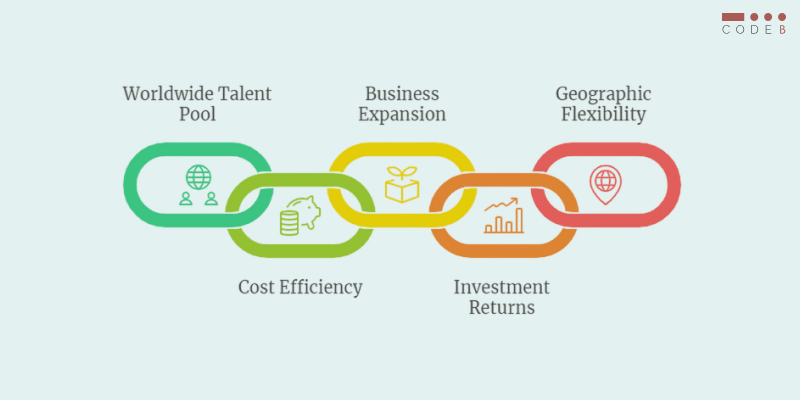
- Access to a worldwide talent pool of developers.
- Eliminate in-house hiring for cost savings.
- Expanding Business.
- Better returns on investments.
- You're not restricted to the talent available in your local area or country.
Best Countries for Offshore Mobile App Development
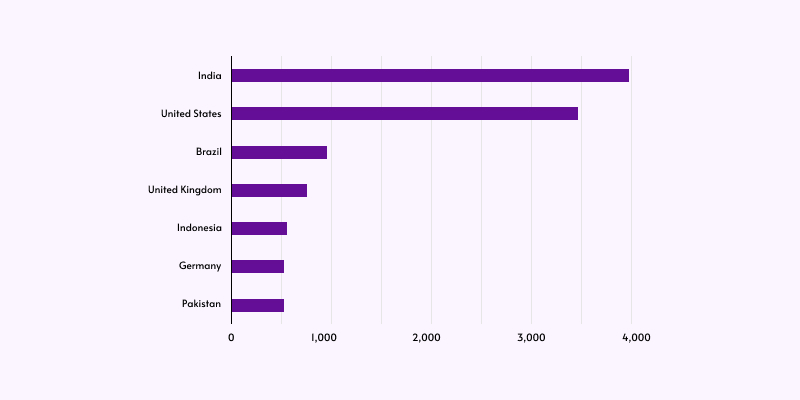
1. India
Demand
- India has been a prominent player in the global outsourcing market for decades, particularly in the IT sector.
- The country has a vast pool of skilled software developers, making it one of the ideal nations to outsource software development, including mobile app developers.
Supply
- With over 4 million software developers, India boasts one of the largest IT workforces in the world.
- Developers here are well versed with the relevant tech & frameworks apt for your mobile app.
- They can help you choose the most suitable platform for deployment.
- Every individual platform (iOS/Android) is different and has varied functionality.
If you plan to build an iOS mobile app for yourself, we have listed a few advantages of iOS app development.
Future Prediction
- The demand for mobile app development in India is expected to continue growing due to the increasing adoption of smartphones, digitalization initiatives, and the rise of startups and enterprises investing in mobile technologies.
Value for Money
- India is known for offering competitive rates for mobile app development services compared to Western countries.
- On average, you can expect to save 60-70% on development costs by outsourcing to India.
You can refer to the cost breakdown for mobile app development in India to understand the budget & alternatives available for mobile app features.
2. United States
Demand
- The United States is a major market for mobile app development services, driven by a thriving tech industry, innovative startups, and enterprises investing in digital transformation.
Supply
- The U.S. is home to many skilled developers with expertise in mobile app development.
- Silicon Valley, in particular, serves as a hub for tech talent, attracting developers worldwide.
Future Prediction
- The demand for mobile app development in the U.S. is expected to remain strong, fueled by technological advancements, the proliferation of mobile devices, and the continuous evolution of consumer preferences.
Value for Money
- While the U.S. offers high-quality development services, the costs are typically higher compared to outsourcing destinations like India.
- However, working with U.S.-based developers can offer advantages such as closer collaboration, easier communication, and cultural alignment.
3. China
Demand
- China is experiencing rapid growth in its mobile app market, driven by a large population of smartphone users and a thriving digital economy.
- The country has a strong demand for mobile app development across various industries.
Supply
- China has a sizable talent pool of mobile app developers, with expertise in both native and cross-platform app development.
- Chinese developers are known for their proficiency in technologies like Android, iOS, and WeChat mini-programs.
Future Prediction
- The mobile app market in China is expected to continue expanding, driven by factors such as urbanization, rising disposable incomes, and increasing internet penetration in rural areas.
Value for Money
- While China offers competitive rates for mobile app development, the cost savings compared to Western countries may not be as significant as outsourcing to countries like India.
- However, China's proximity to manufacturing hubs and access to emerging technologies can offer additional value for certain projects.
Also read: Dedicated IT outsourcing models best suitable for your hiring requirements.

Wide Tech Stack Expertise Availability.
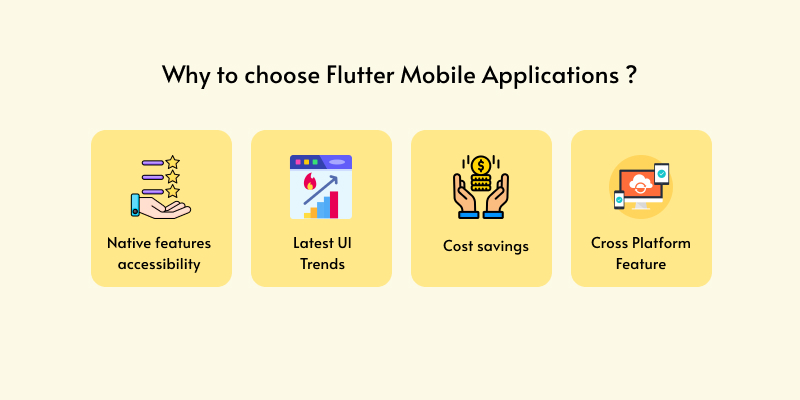
Hiring a dedicated offshore team for Flutter mobile applications is a reasonable ask. - Why?
- Access to native features
- Intrusive UI
- Cost-effective
- Cross-Platform Feature
Native features accessibility
- Flutter provides developers with access to native features of the underlying operating system (OS), such as camera, GPS, sensors, and storage.
- This is facilitated through platform channels, which allow communication between Flutter code and platform-specific code written in Java/Kotlin for Android or Objective-C/Swift for iOS.
- Developers can seamlessly integrate native functionality into their Flutter apps.
- You can make use of flutter-centric design patterns dedicated to ensuring a smooth user experience and leveraging the full capabilities of the device.
Latest UI Trends
- Flutter offers a rich set of customizable widgets and tools for building user interfaces (UIs).
- However, some developers may find Flutter's UI approach intrusive, especially if they are accustomed to traditional native development or other cross-platform frameworks.
- Flutter follows a reactive UI programming model, where the UI is rebuilt in response to changes in the application state.
- While this can lead to highly performant and responsive UIs, it may require developers to adapt their mindset and coding practices.
Cost savings
- With Flutter, developers can write code once and deploy it on multiple platforms (iOS, Android, web, and desktop), reducing development time and costs associated with maintaining separate codebases for each platform.
- Additionally, Flutter's hot reload feature allows for rapid iteration and debugging, further accelerating development cycles and potentially reducing time-to-market and overall project costs.
Cross-Platform Feature
- One of the key strengths of Flutter is its robust cross-platform support. Developers can write code in Dart, Flutter's programming language, and compile it to native ARM code for iOS and Android or JavaScript for web applications.
- Flutter's "write once, run anywhere" approach enables consistent UI and behavior across platforms, minimizing the need for platform-specific tweaks and optimizations.
- Moreover, Flutter's unified development environment streamlines the development process by providing a single codebase, tooling, and libraries for building applications across multiple platforms.
Flutter's offshoring costs for India range between $20 and $60 per hour, depending on the seniority and experience of the developer. You can explore a full breakdown of the pricing structure here.
Meanwhile, the average rate per hour in America is approximately between $150 and $250, depending on the quality of deliverance and experience. If you're looking for reliable firms that develop flutter apps in India, there are several experienced teams that offer quality work at competitive rates.
React Native
React Native framework is majorly used in countries like the United States, India, United Kingdom.

The cost of hiring a dedicated offshoring mobile development team using the React Native framework would be much cheaper if outsourced from Asian countries like India, China, and the Philippines when compared to the North American/Native American part of the world.
Why offshore React Native mobile app development services?
- Rapid Mobile App Development.
- Business app development.
- To build multimedia applications like YouTube/Spotify.
- Getting a cross-functional app developed can become expensive, which is why offshoring can be a great alternative to save money.
- More than anything, software development firms providing offshore development have experts with relevant experience to lead a project remotely with less hassle.
- So, the rest of your management can focus on sales and marketing of the company.
Offshoring React Native and Flutter app development is a great option for MNCs as well as small businesses.
For any software development project (big or small), you need to streamline your entire R&D process before you start working on the project.
Similarly, for every flutter & react-based mobile project, you should have a dedicated CI/CD pipeline formulated to set up your deliverables.
Should frameworks and programming languages matter?
When outsourcing mobile app development, the choice of frameworks and programming languages is not just a technical consideration; it’s a strategic decision that affects the project's overall success.
Frameworks and languages determine the development speed, the app’s functionality, and how easily it can adapt to future changes.
Here’s why these choices matter:
Development Time
- The right framework can drastically reduce the time it takes to build an app.
- For instance, cross-platform frameworks like Flutter or React Native allow developers to write a single codebase that works on both iOS and Android, cutting timelines by up to 30% compared to native development.
Cost Implications
- Frameworks like React Native not only save time but also lower costs by minimizing the need for separate development teams for different platforms.
Performance
- For apps requiring high performance, native languages like Swift (iOS) and Kotlin (Android) are ideal.
- They provide direct access to platform-specific features and ensure smoother user experiences.
Future Maintenance
- Apps built with widely used frameworks are easier to update and maintain.
- Additionally, popular languages and frameworks ensure access to a large developer community, simplifying troubleshooting and enhancements.
For businesses, the decision to outsource should involve detailed discussions with the service provider about the tech stack.
It’s essential to align the choice of frameworks and languages with project goals and target audience.
When should you consider offshore mobile app development?
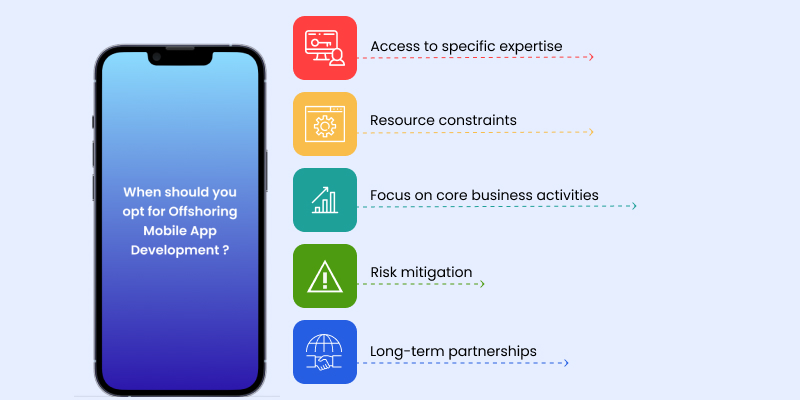
Access to specific expertise
- When you require specialized skills or expertise that may not be readily available locally, offshore teams can provide access to a diverse talent pool with the necessary technical capabilities.
Resource constraints
- When your internal resources are limited or stretched thin, outsourcing mobile development can help augment your team's capacity and accelerate project timelines.
Focus on core business activities.
- Outsourcing mobile development allows you to focus on your core business activities while leveraging the expertise of external partners to handle technical aspects.
Risk mitigation
- Offshore teams can help mitigate risks associated with talent shortages, technology obsolescence, or unexpected changes in project scope, providing additional resilience to your development efforts.
Long-term partnerships
- Establishing relationships with offshore development teams can lead to long-term partnerships, where they become an extension of your internal team.
If you're considering setting up a long-term remote engineering unit, you might find it helpful to explore how leading companies structure their dedicated offshore center, including costs, engagement models, and operational benefits.
Here’s a quick comparison of outsourcing benefits tailored for enterprises of different sizes:
Large enterprises (1000+ Employees)
Why Outsource?
- Large enterprises often face challenges managing internal resources for large-scale app development, making outsourcing a strategic choice to access specialized talent.
- Outsourcing ensures seamless integration of apps into enterprise ecosystems with necessary security measures and cloud scalability.
Medium-sized businesses (500+ Employees)
Why Outsource?
- These businesses often need to modernize operations without straining budgets. Outsourcing helps strike the right balance between innovation and cost-efficiency.
- Working with industry-specific experts ensures the apps meet sector-specific compliance and operational demands.
Startups (100+ employees)
Why Outsource?
- Startups focus on speed and agility. Outsourcing enables quick MVP development, helping startups launch early and iterate based on user feedback.
- Effective solutions from outsourcing partners prepare startups for future growth without extensive upfront investment.
Why do startups and SMEs outsource mobile app development?
.png)
For startups and SMEs, the challenge isn’t deciding whether an app is worth building and it’s getting a functional version live before budgets tighten, competitors move faster, or internal teams get overloaded. Outsourcing gives them a practical way to move from concept to execution without long hiring cycles or operational slowdown.
Here’s why this approach works for both early-stage companies and growing SMEs:
Faster execution without internal hiring delays
Outsourcing removes the time spent recruiting designers, developers, QA engineers, and DevOps specialists. Offshore teams already have:
- A complete delivery setup (PM, devs, QA, DevOps)
- Established sprint workflows
- Tools and processes that are ready to deploy
This lets SMEs and startups move straight into development instead of building a team from scratch.
Better budget management
Startups and SMEs work with tighter budgets than large enterprises, so every hire has to justify itself. Outsourcing helps them use their money more efficiently by accessing high-quality engineering talent at workable rates and avoiding the financial pressure of building a full internal team too early. Instead of investing the entire budget into a couple of full-time hires, they can fund design, backend, mobile development, testing, and early iterations without overshooting their runway.
Immediate access to required skill sets
Apps rarely rely on one developer or one tech skill. Most products need a mix of frontend, backend, cloud, and testing expertise. Outsourcing gives startups and SMEs quick access to the exact roles their app demands, such as
- Flutter or React Native development for cross-platform builds
- Backend and API engineers for data flow and architecture
- Manual and automation QA specialists for testing
This removes the need to hire multiple specialists individually, which saves both money and time.
Flexibility during product-market fit
Early-stage teams adjust direction quickly based on user feedback, traction, and feature validation. Outsourcing supports this pace by making it easy to expand the development team during sprint-heavy phases and scale down during research or fundraising cycles. This flexibility keeps development aligned with real market responses instead of locking the company into rigid staffing.
Stable long-term support
Launching an MVP is only the first milestone. Apps require steady improvements, bug fixes, and periodic upgrades. A dependable outsourcing partner can manage ongoing needs like:
- Feature updates and roadmap improvements
- Architecture enhancements and code cleanup
- CI/CD setup, monitoring, and overall release management
This helps startups and SMEs maintain momentum after launch without rebuilding teams or losing context when the product enters its next stage.
Offshoring platform-based developers
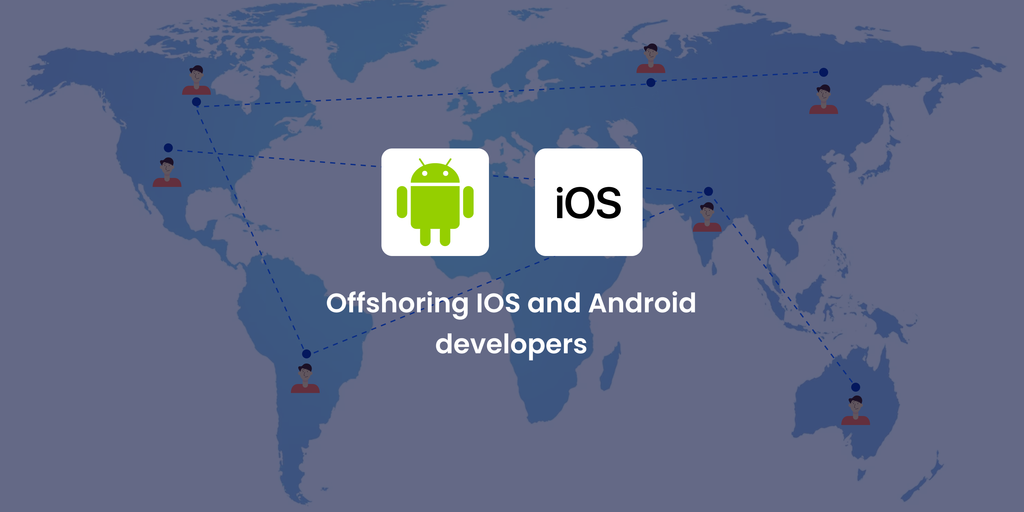
Your application can either run on one of the two platforms (iOS/Android), or it can have a cross-functionality commonly considered a hybrid app that can run on multiple platforms, enabling users to utilize your application on any Android or iOS device.
Offshoring IOS and Android developers
- I am outlining approximate figures and essential requirements that iOS/Android developers typically mention when discussing offshoring app development needs.
- There are several key factors and requirements that developers typically outline to ensure a smooth and successful collaboration.
- These are generally standard operating procedures (SOP) in the world of software development (IT).
Project scope and discovery phase
- Here is a compiled list of common requirements along with their approximate costs, recognizing that the total expenditure hinges on the level of detail desired for research and planning for app development and deployment.
- However, it's important to note that these factors may vary significantly based on the unique customizations and specific needs of your enterprise application.
If you’re evaluating offshore talent for iOS or Android development, you can also explore our curated list of best app development firms, which helps you compare pricing, experience levels, and engagement models more accurately.
Research and planning
Development phase
Native app costing vs. hybrid app costing
Deployment phase
Testing phase
A/B testing for your enterprise mobile application
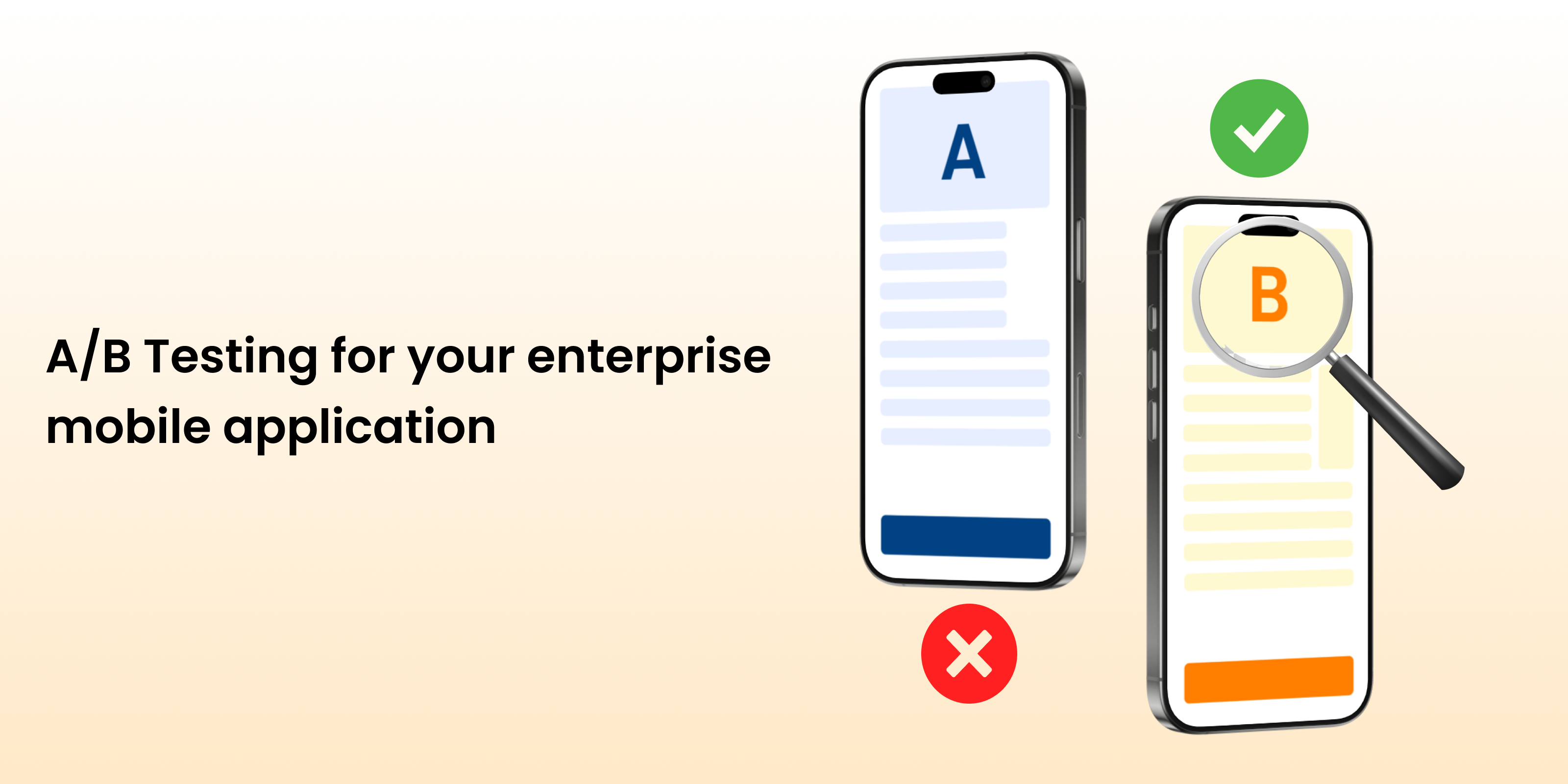
Your mobile applications must undergo a certain level of testing.
Why so?
- Testing functionalities ensures that your app is optimized for user satisfaction and performance.
- Thorough testing helps you gauge whether the approved elements, including UI/UX features, functionalities, and content, are truly resonating with users.
- By comparing different versions of these elements, you can accurately determine which variations lead to higher engagement, conversions, or other key performance indicators.
- Moreover, post-deployment testing is essential to verify that updates or modifications to both the frontend and backend components do not adversely affect the app's speed, loading times, or overall functionality.
Usage of A/B testing
- It allows you to assess any changes made to the app comprehensively, ensuring that the user experience remains flawless and that any potential issues are promptly identified and addressed.
- By continuously conducting A/B tests throughout the lifecycle of your enterprise mobile application, you can iterate on your app's features and functionalities, making data-driven decisions to enhance user satisfaction, retention, and overall performance.
Here’s a breakdown of how A/B testing works
(specifically for mobile app development, with methods that offshore developers can use to test across devices, operating systems, and conditions to yield real-world insights)
Define goals and hypotheses
Set specific objectives, like improving user engagement, increasing retention, or optimizing the onboarding flow.
Define a clear hypothesis for each test (e.g., “Changing the CTA button color will increase click-through rate by 10%”).
Benefit
A clear hypothesis helps align offshore teams with the desired outcomes, ensuring focused and actionable testing.
Segment the audience
Offshore teams can use user segmentation to target specific groups based on demographics, location, usage patterns, or device type.
Benefit
Targeted segmentation ensures results are relevant to distinct user groups, allowing more granular adjustments that are critical for apps with a global audience.
Choose testing methodology
A/B Testing (Split Testing)
Create two variants (A and B) and measure which performs better on key metrics.
Multivariate Testing
Tests multiple elements simultaneously (e.g., button color, text, layout) to understand how combinations affect user behavior.
Phased Rollout
Implement changes in stages, allowing offshore teams to control the impact and scale of updates based on real-time feedback.
Benefit
A/B testing focuses on simple changes, while multivariate testing allows for more complex insights. Phased rollouts let developers catch major issues before a wide release, ensuring user satisfaction.
Testing across environments
Device and OS Testing
Offshore teams can conduct tests on various devices (iOS, Android) and operating systems to account for differences in performance and experience.
Network Condition Testing
Testing under different network speeds (4G, 5G, Wi-Fi) helps gauge app performance under real-world conditions.
Benefit
This ensures app reliability and usability across diverse conditions, avoiding performance issues that can negatively impact user experience in specific markets.
Analyze results and draw insights
Statistical Analysis
Using metrics like conversion rate, retention rate, and engagement score, offshore teams can measure success against the initial hypothesis.
Heatmaps and User Flows
These provide visual insights into user behavior, showing where users tap or drop off within the app.
Benefit
Detailed analysis helps identify user preferences and pain points, allowing developers to implement changes that enhance engagement and satisfaction.
Implement and monitor changes
Gradual Rollout of Winning Variant
Offshore teams implement the successful variant across all users while monitoring KPIs to ensure performance stability.
Post-Launch Testing
Continuous monitoring and A/B testing on new features help maintain quality and performance standards as the app evolves.
Benefit
Post-launch testing catches potential issues early, ensuring updates don’t disrupt the user experience and maintaining app reliability long-term.
Final budget breakdown
For any business owner, having a clear understanding of the approximate cost breakdown for mobile app development is essential.
By familiarizing yourself with the typical pricing for required resources, you can confidently negotiate, request accurate quotes, and stay ahead of any offshore or outsourced contractors.
This knowledge empowers you to make informed decisions and ensures transparency throughout the development process.
